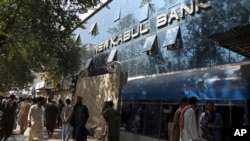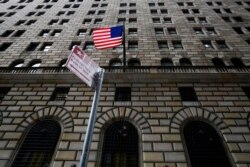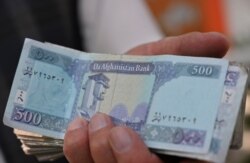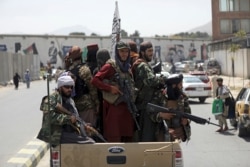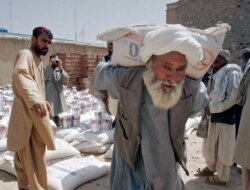As the Taliban take power in Afghanistan for the first time in 20 years, Afghans face not only a humanitarian crisis but also an economic crisis that threatens to make an already dire situation considerably worse. But just how bad things can get, and how much potential leverage the economic situation gives the U.S. and its allies over the Taliban, is far from certain.
Asked about the future of the Afghan economy, Alex Zerden, who served as the top U.S. Treasury Department official in Afghanistan in 2018 and 2019, said, "I don't think there is a definitive answer, and anybody who does doesn't know the problem set very well, because there are a lot of different ways that this can shake out."
Even before the Taliban took control, the economic situation in Afghanistan was tenuous at best. In March, the World Bank described it as "shaped by fragility and aid dependence," with 75% of public spending funded not by the government's own revenue generation, but from grants from international institutions and individual countries such as the United States.
Donors suspend aid
After the Taliban captured Kabul on Sunday, those donors began announcing that they would be turning off the financial spigots, at least for the near term. The U.S. announced that it would freeze billions of dollars in emergency reserves that Afghanistan's central bank kept on deposit at the Federal Reserve Bank of New York. The International Monetary Fund said that a tranche of funding worth $450 million, set to be delivered to the Afghan government next week, would be suspended, and Germany announced that $300 million in scheduled aid would not be delivered.
President Joe Biden promised that humanitarian assistance would continue to flow to the country despite the Taliban takeover, saying, "We will continue to support the Afghan people. We will lead with our diplomacy, our international influence and our humanitarian aid."
However, the total withdrawal of U.S. and allied troops from the country makes it unclear whether and how international aid organizations, major go-betweens for foreign aid spending, will be able to operate in the country moving forward.
Governing 'is not easy'
Ajmal Ahmady, who served as the governor of Afghanistan's central bank from 2019 until he fled the country last weekend, has been using his Twitter account to explain the country's dire economic straits. Not only has the bank lost access to its reserves, he said, but shipments of physical U.S. currency, which the country's banking system relied on to satisfy customers' desire for a medium of exchange more stable than the government-issued afghani, have now been cut off.
A scarcity of dollars will likely make the relative value of the afghani plunge, driving up prices for goods and services that may become more scarce themselves as international aid and trade flows are disrupted.
"(The) Taliban won militarily — but now have to govern," Ahmady wrote. "It is not easy."
Changed economy
The economy the Taliban have taken over is vastly changed from the one they presided over from 1996 through the end of 2001. Despite its manifold problems, Afghanistan's economy is far larger and more urbanized than it was two decades ago.
In 2002, the first full year after the Taliban's ouster, Afghanistan's official gross domestic product was just $4 billion. In 2020, according to World Bank figures, the country's GDP had nearly quintupled, to $19.8 billion. In major cities, infrastructure projects brought modern technology, such as smartphones, to ordinary Afghans.
But that enlarged economy was driven, for the most part, by foreign aid and a massive trade deficit exacerbated by the fact that 44% of the country's workforce was occupied in low-yield agriculture and 60% of households relied on agriculture for at least some of their income.
Leverage over the Taliban
The United States still considers the Taliban a terrorist organization, and it remains on a sanctions list maintained by the Office of Foreign Assets Control. Under current U.S. policy, that makes it virtually impossible for a financial institution under Taliban control to have any meaningful participation in the global financial markets.
The Biden administration appears to believe that this may be a point of leverage that the United States can use to influence the group's actions now that it is in power.
"I think they're going through sort of an existential crisis. … Do they want to be recognized by the international community as being a legitimate government?" Biden said in an exclusive interview with ABC news on Thursday. "I'm not sure they do."
He continued: "But they also care about whether they have food to eat, whether they have an income ... that they can make any money and run an economy."
Hunger in Afghanistan
Afghans are already suffering from widespread hunger, exacerbated by a severe drought that devastated wheat production. The United Nations World Food Program estimates that 1 in 3 Afghans is currently at risk of severe or acute hunger. Half of all Afghan children under five already suffer from acute malnutrition, according to the U.N.
U.N. officials say the Taliban have assured them that they will be allowed to continue food aid deliveries in the country.
Endgame not obvious
Even given the financial challenges they are facing, said Zerden, the former Treasury official, it isn't clear how much leverage the Taliban are subject to from foreign governments.
For example, he said, Western governments may be overestimating the amount of money the Taliban actually need to keep Afghanistan running. The group, for all its human rights abuses, has traditionally been far less corrupt than the government it overthrew, meaning that less of the money it does collect will end up being siphoned off into the personal accounts of government officials.
And the Taliban are not without the ability to raise revenues internally. Zerden, who now runs Capitol Peak Strategies in Washington, said the Taliban have operated a shadow government for two decades, effectively taxing large swaths of the country by taking a share of money from opium sales, illegal mining and smuggling and using those funds to supply services to the people under their control and to fund and supply military operations.
Now, with official control of all border crossings, the group is in a position to begin extracting customs fees on exports and imports.
Economy vs. Ideology
Those trade routes are vitally important to the group's future, said Graeme Smith, a consultant researcher for the Overseas Development Institute who has spent years studying Afghanistan. So long as regional powers such as Pakistan, China and Iran continue to trade with Afghanistan, they will provide a steady and lucrative source of revenue.
Additionally, Smith said he is deeply dubious about predictions that the Taliban will be swayed by promises of increased inclusion in the modern economy if it means abandoning their core ideology.
"I'm hearing informally from folks in D.C. that there are a lot of hopes being placed on the ability to curb Taliban behavior by applying financial leverage," he said.
While that leverage will be important, he said, "Those expectations are wildly out of whack. We think we have more power than we do."
Editor’s note: Paragraph 10 of this story has been updated to correct Afghanistan's gross domestic product to $4 billion.




